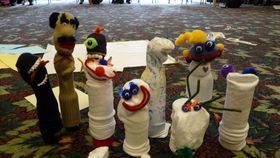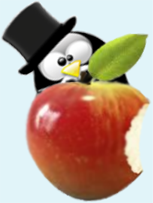Sat July 27 2013
 Barnes & Noble between Scylla and Charybdis Barnes & Noble between Scylla and Charybdis
|
|
06:43 PM by Alexander Turcic in E-Book General | News
In the tablet market, the only upside for Barnes & Noble is Microsoft's recent involvement in the Nook business:
Don't even consider the retail business, if you read the numbers.
Lastly, while revenues in college book sales are on the rise, earning margins have been decreasing (due to investments, they say) and might continue to do so in the long-run.
Things certainly aren't looking good for B&N. Question is, what's really left for this company that used to be a behemoth in the book industry? Or, differently asked, does B&N even deserve to have a future?
[related: Are bookstores still worth fighting for?, image: Flickr] |
|
[ 12 replies ] |
 MobileRead Week in Review: 07/20 - 07/27 MobileRead Week in Review: 07/20 - 07/27
|
|
07:00 AM by Alexander Turcic in Miscellaneous | Week in Review It was the week that was. Here's what MobileRead's been talking about since last Sunday: E-Book General - News
E-Book General - General Discussions
E-Book General - Reading Recommendations |
Thu July 25 2013
 Ectaco caught using MobileRead to create fake buzz about Jetbook Ectaco caught using MobileRead to create fake buzz about Jetbook
|
|
02:12 PM by Alexander Turcic in E-Book General | General Discussions
We pride ourselves on being an open and welcoming community. Everyone is invited to join the discussions, whether in an official capacity or otherwise. Full disclosure is not a requirement, as long as you don't attempt to distort the views in our forums, either by pretending to be a delighted customer of your own brand, or by pretending to be a disgruntled user of a competing product. This would be considered astroturfing, which is designed to counteract real opinions and confuse anyone seeking the truth. Astroturfers will be banned without notice. Ectaco sock puppets were identified through having identical IP addresses registered to Ectaco, Inc. We tried to reach out to the company directly on the issue, but received no response. The moral of the story: If you're having trouble energizing a legitimate set of brand evangelists, don't attempt to disguise false engagement by having employees or affiliates pretend to be customers. It will most certainly be found out. [image: Flickr] |
|
[ 144 replies ] |
 Jane Austen to appear on Bank of England £10 note Jane Austen to appear on Bank of England £10 note
|
|
02:05 PM by HarryT in E-Book General | News
Full story at http://www.bbc.co.uk/news/business-23424289 |
|
[ 54 replies ] |
 EPUB3 is dead, long live EPUB3Lite... EPUB3 is dead, long live EPUB3Lite...
|
|
12:31 PM by fjtorres in E-Book General | News
From the Association of American Publishers comes a last ditch effort to save epub3 by killing epub3 and replacing it with a de-bloated version: AAP EPUB 3 Implementation Project. Via Digital Reader.
With that timeline they'll be lucky to get the spec implemented in readers for Xmas 2014. Which says epub3 not only won't be ready this year, they don't expect it to be ready next year either. |
|
[ 65 replies ] |
 Penguin ends Apple Agreement Penguin ends Apple Agreement
|
|
12:27 PM by kennyc in E-Book General | News
|
|
[ 3 replies ] |
 PW: Conspiracy Fines detailed, so far... PW: Conspiracy Fines detailed, so far...
|
|
12:26 PM by fjtorres in E-Book General | News
Note that the way the "reparations" will be paid is a credits for future ebook purchases so they'll get the money right back. As expected, they got off easy, though you'd never believe it to hear them whine about getting a wrist slap. Glass tower crime pays off, again. |
|
[ 34 replies ] |
Mon July 22 2013
 Aussie regulator: E-book price fixing is not our problem Aussie regulator: E-book price fixing is not our problem
|
|
08:06 PM by Alexander Turcic in E-Book General | General Discussions
We've seen plenty of examples here in the forums where MobileRead members pointed out the difference in e-book prices, usually to the disadvantage of our Aussie friends. Instead of fretting about e-book prices, the Australian argues more attention should be given to snapper fish and giant squids (subscription req):
[image: Flickr] |
|
[ 19 replies ] |


 When we learned about the
When we learned about the  We're a bit heavy-hearted to report the news, but recently it was discovered by one of our vigilant members that someone, or several people, employed by, or affiliated with, Ectaco used sock puppets in our forums. Posing as regular consumers, these sock puppets were used to create phony grassroots support for Ectaco products, specifically for the Jetbook device. Not just recently, but for several years.
We're a bit heavy-hearted to report the news, but recently it was discovered by one of our vigilant members that someone, or several people, employed by, or affiliated with, Ectaco used sock puppets in our forums. Posing as regular consumers, these sock puppets were used to create phony grassroots support for Ectaco products, specifically for the Jetbook device. Not just recently, but for several years.
 ...maybe.
...maybe.
 What do you do if something smells fishy? You ask your local competition regulator to sniff around until they find the potential source of the stink. Unfortunately for Senator Nick Xenophon, and for all our Aussie members, the Australian Competition & Consumer Commission (ACCC) turned down
What do you do if something smells fishy? You ask your local competition regulator to sniff around until they find the potential source of the stink. Unfortunately for Senator Nick Xenophon, and for all our Aussie members, the Australian Competition & Consumer Commission (ACCC) turned down  Latest E-Books
Latest E-Books

